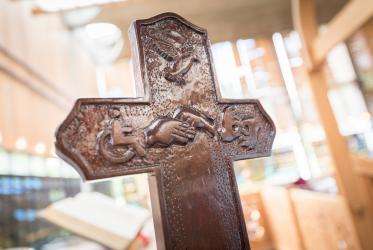By Fredrick Nzwili*
The phenomenon has spread widely in Africa and other parts of the world, the conference heard, at a time when pandemics such as COVID-19 have brought into focus the key role of faiths in health and healing.
The conference, the third in a series by All Africa Conference of Churches was attended by church and lay leaders, youth and persons with disabilities from 28 African countries. From 22- 24 November, participants tackled the subject of controversies about health and healing.
“We are dealing with health and healing because that’s where there has been a lot of misleading theologies in Africa. Teachings are undermining human dignity and putting lives of people at risk. That’s why this is important,” said Rev. Prof. Bosela Eale, All Africa Conference of Churches director of Theology, Interfaith Relations and Leadership in an interview.
“We have seen some church ministers asking congregants to eat grass, for example. In some other places, pastors quoting a Bible verse have instructed the people to drink anything and they would not be harmed. The people are dying after following the instructions.”
The series of conferences are part of organization’s 2019- 2023 plan that seeks to accompany African churches in combating wrong theologies and misinterpretation of the scriptures, that trigger false doctrinal teachings and practices. The first two conferences addressed misleading theologies and the theologies of wealth and prosperity.
“The role of faith communities has now been highlighted that they cannot be passive or relegate health and healing to the back bench. That has actually helped them be at the forefront—high on the agenda. It is not an afterthought,” said Dr Mwai Makoka, World Council of Churches director for Health and Healing, while adding that the symposium was critical.
The official said the faiths should be able to detect both misinformation and disinformation which are rampant worldwide.
“That’s why this meeting is critical because we have to highlight to the faith leaders, that they do not have all the answers…. but there should be ways and means which they can link up with credible Christian health practitioners,” he said.
In treating and managing COVID-19, there are a lot of myths and misinformation especially, in some churches where congregations believe they cannot contract the disease because they are protected by the blood of Jesus, the conference heard.
“It’s a failure to balance between modern medicine and faith healing,” said Monica Nambaba, a gender officer at the Africa Christian Health Association Platform. “We are saying, when it comes to COVID-19, anyone can get infected and therefore, it is important for people to get tested and the Christians to accept the vaccines.”
According to Rev. Prof. Simangaliso Kumalo, an associate professor of Religion and Governance at the University of KwaZulu Natal Pietermaritzburg told the participants that the theology emerging from the discussions demonstrated that faith and science were not contradictory in faith and healing.
“Health care professionals should be seen as playing a divine role, which should be complemented by faith and traditional healers. Therefore, rather than regarding the COVID-19 vaccine as a mark of the beast, it should be regarded as manna from heaven, as God answers our prayers,” said Kumalo.
*Fredrick Nzwili is a freelance journalist based in Nairobi, Kenya.








